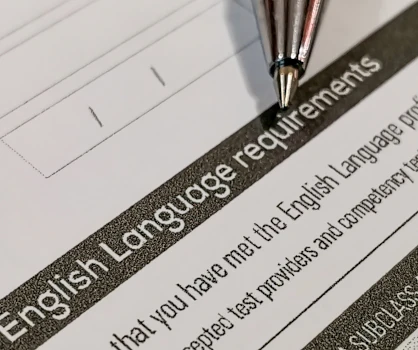Why English Language Proficiency is Important for Holistic Health Practitioners
Monday, February 06, 2023, 01:35 PM
As a holistic health practitioner in Canada, communicating with clients effectively is essential to maintaining a professional practice. Successful communication can improve client-practitioner relationships, reduce the likelihood of rejected claims, and reduce barriers to helping clients meet their wellness goals.
As a business owner or self-employed practitioner, it is equally important to understand the ins and outs of running a business, from taxes to record keeping to insurance claims.
Considering this, English Language Proficiency (ELP) is central to a holistic health practice. With the high level of communication required in the industry, proficiency in English supports a practitioner's professional standards.
Think about it; you want your doctor to understand the symptoms you're experiencing and address your concerns or questions about your well-being. The same goes for your massage therapist and holistic practitioner.

What is English Language Proficiency (ELP)?
English language proficiency means that someone can communicate in oral and written English to an acceptable standard. In Canada, there are different ways to show proof of proficiency in English, including:
- Canadian high school diplomas
- transcripts that show completion of English 30 or Grade 12 English equivalent
- proof of completion of General Educational Development (GED) test
- results from a recognized ELP test that meet a required score
To apply for NHPC membership, practitioners must meet the Association's ELP requirements, which were formalized in 2017.
Why is ELP Important and Who Does it Protect?
Sufficient understanding of English protects everyone.
- The Association: NHPC staff need to communicate with members to share important information, such as Standards of Practice and the Code of Ethics.
- Clients: Clients must understand their treatment plan and give informed consent to their practitioner. Members and clients must have clear communication to avoid misunderstandings.
- Industry Stakeholders: Members must connect with different industry stakeholders (allied health professionals, health benefits providers, law enforcement, professional associations, and regulatory bodies) to carry out their duties and responsibilities.
- Members: Even with good intentions, misunderstandings can result from a lack of clear communication and language barriers. These misunderstandings may also stem from a difference in cultural norms (for example, in different countries and cultures, the requirements for draping may be different). The way these differences can be communicated is through English proficiency.
Written communication is just as important as verbal communication, and record keeping is a significant part of the industry (for example, intake forms, receipts, financial and billing information, detailed clinic notes).
What is the Purpose of ELP requirements?
The NHPC formalized its ELP requirement for applicants in 2017, because recognized schools do not have standardized ELP requirements of their own.
In regulated provinces, massage therapy is governed by a government-appointed panel called a College of Massage Therapists. They have their own rules and regulations to ensure safe and professional practice, including an entrance exam that practitioners would need ELP to pass. The massage therapy school curriculum in these provinces is also standardized.
In Canada, massage therapy is regulated in British Columbia, Ontario, Newfoundland and Labrador, New Brunswick, and Prince Edward Island.
What Are Members Responsible For?
All NHPC members must be able to fully understand NHPC materials, including:
- Code of Ethics
- Bylaws
- Standards of Practice
- Continued Competency Program
- policies and guidelines
- communications about membership (e.g., renewal notices)
Understanding these materials can help to reduce the risk of liability claims caused by miscommunications and the inability to fully understand scope and standards of practice.
It is key that members understand these documents and agree to abide by them in their professional practice, or they may risk their membership standing with the NHPC.
It also helps members understand their rights and access all the benefits available to them as a member.
We're Here to Help!
The NHPC is committed to ensuring members are fully equipped in their professional career, and English proficiency is important in a holistic health practitioner's career development.
Here is list of resources to help those who wish to enhance their knowledge or brush up on their skills:
- Duolingo – NHPC recognizes Duolingo tests as proof of English proficiency
- Rosetta Stone – a paid tool to learn new languages
- Online English Course – a free course through Queen's University
- Language Maintenance Tools – free online English self-assessment tools offered by the Government of Canada
A Universal Benefit
English language proficiency is a benefit to everyone in the massage therapy and holistic health care industry.
For questions about English language proficiency, either from a member standpoint or in public interest, please get in touch with our Membership team at memberservices@nhpcanada.org.

